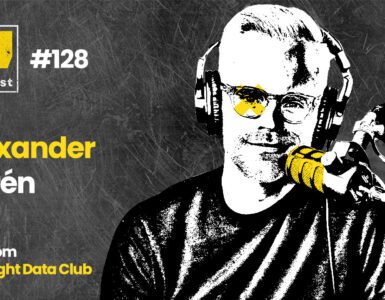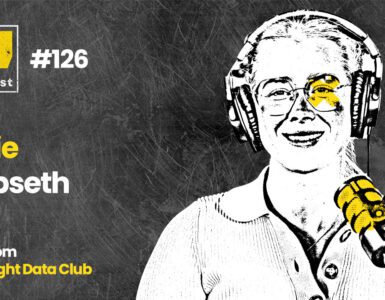Data Scientist, Data Analyst, Machine Learning Engineer or another title, the importance, need, and interest for a career in the data field is increasing.
During the insightful and inspiring conversations with some of the speakers at this edition of the Data Innovation Summit and Nordic People Analytics Summit, we had the opportunity to get to know what advice helped them grow their careers. But, they also shared some of their career tips for other like-minded professionals.
This article summarizes some of the advice that we believe will be valuable for anyone that plans to start or build a career in data science, data analytics or people analytics.
Advice #1: Start soon, start now and start with a simple approach
Finding a direction for a career journey can be challenging and postpone the decision making process. But we found the inspiration that is needed.
“My best advice I would like to share with any data enthusiast is to start now and get your hands dirty, be vulnerable and start soon because the sooner you put yourself out there, the sooner you learn and become an expert in your field.”, says Anh Tran, Data Analyst, Ex Booking.com.
Taking the first steps of the career journey is difficult and that is why it is important to choose simple steps and strategies.
“I think the best advice I’ve ever gotten is to start with the simplest possible approach and build up from that. It can be tempting to jump straight into a complicated state-of-the-art deep neural network model, but it’s much easier to find issues with your data and understand the constraints of the problem if your initial model is simple. And you’ve probably heard this many times before, but I would repeat that making sure you understand your dataset is probably the single most important thing, especially in the industry where the real-world data you’re working with can often be noisy, biased, or incomplete.”, Eliisabet Hein, Data Scientist at Tink.
Some similar advice has Noelia Gonzalez, Manager EA Loc Analytics at Electronic Arts (EA).
“The data world is a big world, with many branches within the field. I have had many titles in this field in my career, such as Data Scientist, Data Analyst, Business Intelligence, Data Professor, and many more. However, whatever your data-title you hold currently, it always starts somewhere and begins from learning new.”, adds Gonzalez.
Advice #2: Find out where your skills or interests fit the most
Not always on the road to a successful career there are opportunities to stand out. And we concluded that that’s maybe because not always the skills and interests fit the position. To overcome that challenge follow the advice that Jacob Nielsen, Senior People Analytics Specialist at Grundfos has.
“I would recommend everyone with the slightest interest to read more about what people analytics is and how it can elevate your business to new highs. Sadly, I do not remember the source of this great piece of learning I acquired in my early days within people analytics, but to succeed with people analytics, a mix of skill sets must be acquired.
Not necessarily by the same person, but a team should consist of someone having 1) the business acumen skills to understand the business needs and focus on the right problems, 2) contain strong HR domain knowledge, as we are working with people there is not always simple solutions, 3) being good at working with data and statistics to ensure the analysis results are robust. Decisions can be made based on statistical work, so it must be as correct as it can get working with data, 4) being good at making visualizations. If one is not putting together some eye-catching and interesting visualizations, one risks ending up with a boring output, or maybe something that confuses the receiver. Lastly, 5) storytelling must be mastered. Without storytelling there is a risk of not getting the message across, and that would lead to no actions taken based on the hard work done.
I know, that was a long speech before answering the questions, but having set the scene, my best advice is to find out where your skills or interests fit the most and then start there. That way you can lift other areas of the chain and over time master all parts of it to be a true people analytics practitioner. “, says Nielsen.
The best advice he got during his career was “Whatever you do, do it 100%.”
“And for me it has become a sort of mantra. On a professional level, I want to deliver on the given assignments, and on a personal level, I want to be the best version of myself. That sentence helps me stay on track.”, adds Nielsen.


Advice #3: Prioritizing projects is important
Project prioritization is vital since you can manage the time correctly, manage the completion of the project on time, and reach the goals.
“The best advice I have received so far is to always prioritize projects based on potential impact that will be generated, and go above and beyond in making such projects successful. Data Science is considered as a generalist role by many, and hence while having data science breadth knowledge is important, my advice would be to also to focus on data science depth knowledge, such as mathematical details behind algorithms. This will give you an edge over others in the field. Also, being good at storytelling, communicating insights to business stakeholders, building a narrative around your solutions. Participate in as many data science competitions as possible, participate in publishing research papers and get mentors early on in your career.”, Naveed Ahmed Janvekar, Senior Data Scientist at Amazon.
Advice #4: Listen and learn always
Like in every career, same in the data industry, active listening can play an essential role in helping get ahead in the profession. Like with every other skill, this one too can be acquired and developed with practice.
“The best advice I received was when I was still a young consultant – “listen and learn”. It took me off the peak of “Mt. Stupid” and made me realize how much I need to learn. And it is still true today. I’m always excited to learn more, meet new people, collaborate, and come up with new ideas and adopt new technologies. 17 years later and I’m still listening and learning.”, Tal Katzav, Manager, ML & Advanced Analytics at Wärtsilä.
Advice #5: Stay curious, proactive and always ask “why”
What keeps many people motivated during the advancement in their careers is curiosity and the eagerness for development.
“Some of the things I truly believe in, are competence and development. I’ve never stopped developing. I’ve been studying a lot, I’m very curious and I believe that over the years I’ve learned the hard way. It’s me that should take care of my own destiny, not the leaders, not the company I work for. I need to take care of myself continuously. This is the new thing I’ve learnt the last 5 years – continuous competence and development. I’m struggling to keep pace with all technology developments, so I’ve been very proactive. Curiosity, proactiveness, taking care of my own destiny by myself, I think this is something I would strongly recommend to others. Over the years, one thing I’ve realized is that you need to surround yourself with helping hands. I can not learn everything by myself, it is impossible. Start creating trusted relationships with mentors, friends, colleagues. Share your knowledge and experience with others. And be open to the feedback mechanisms that help us to develop and grow as a person, data enthusiast as an order you name it.”, Abul Fahimuddin, Digital Transformation Director, Former Equinor ASA.
Sam Fletcher, Head of Talent Intelligence at PayPal says that it is important to ask “why” and to understand the reason and background behind projects or requests.
“When you’re working in a field like people analytics or Talent Intelligence and have limited time and resources, you have to prioritize the most valuable and impactful work. If you don’t validate requests, you can quickly find yourself working on projects that are only really addressing the curiosity of business leaders, or providing data to an individual or a team who want it because they have heard other groups talking about it. Equally, I’d advise balancing demand from the business with proactive work where you’re identifying real opportunities to make an impact. Your ability to stand back from the business, look cross-functionally, and use data to highlight opportunities or challenges that others might not be seeing is really valuable, but you need to be intentional in creating space to do that.”, adds Fletcher.


Advice #6: Surround yourself with the right people
By “the right people”, we mean colleagues, teammates, mentors, and people in the networks you build that should inspire and uplift during time spent with them.
“The best advice I’ve got was a strangford one, there was no magic but it has been following me now and in the years to come. It was in my early years as an engineer, I had only 2-3 years experience and I started to think about the next step to take in my career: “…Keep doing what you do best at the moment, don’t look left or right, if you are passionate about what you are doing, and if you love what you do, you will automatically do it better and better, and when the moment comes for you to make the next step, you will know it yourself.” And I just repeat this advice. And I can say on top of that – don’t get blinded, especially at the early stages of your career by higher salary promises and managerial positions and something similar. Keep on doing what you do the best, take a good example from motivating and enthusiastic people from your area, it’s good to find these mentors to stick to them and try always to be hands on. Real work practical experience is indispensable. Don’t forget to take more ownership and responsibility in the future, there is no other way around.”, Georgios Gkekas, Chief Technology Officer at vent.io.
Advice #7: Trust yourself, trust data, but follow the rules
This advice by Jarkko Moilanen, Data & API Economist at Data Product Business is very straightforward:
“Trust the data. Whatever you do, make it data-driven. Stop guessing and trusting your gut. Our reptile brains operate on feelings first, and after that, if you’re lucky, with logic. Use data in support functions to help you in making best possible business decisions. Data must be in the DNA of your company.”
Another simple advice has Anna Horvath, Head of Compensation and Benefits at Assa Abloy:
“You need to have and understand the box before you start thinking outside of it. I think it is important to get the basics right and operate well before we start applying changes and bringing in creative ideas. In data protection, you follow the rules.”
Conclusion
There were a few other pieces of advice that were highlighted as crucial for a career in the data industry:
- Be good at storytelling and communication
- Stay passionate about job
- Hold a solid background in the field
- Get feedback and evaluation
We are sure that there are more tips and tricks by other great names on how to succeed in the data industry, but whatever title anyone holds, everything comes down to having the proper education, skills and capabilities
We also hope that we will have an opportunity to meet and talk with other data experts and share their motivational and inspirational recommendations for having a promising career.
Featured image credits: kvrkchowdari on Pixabay
















Add comment